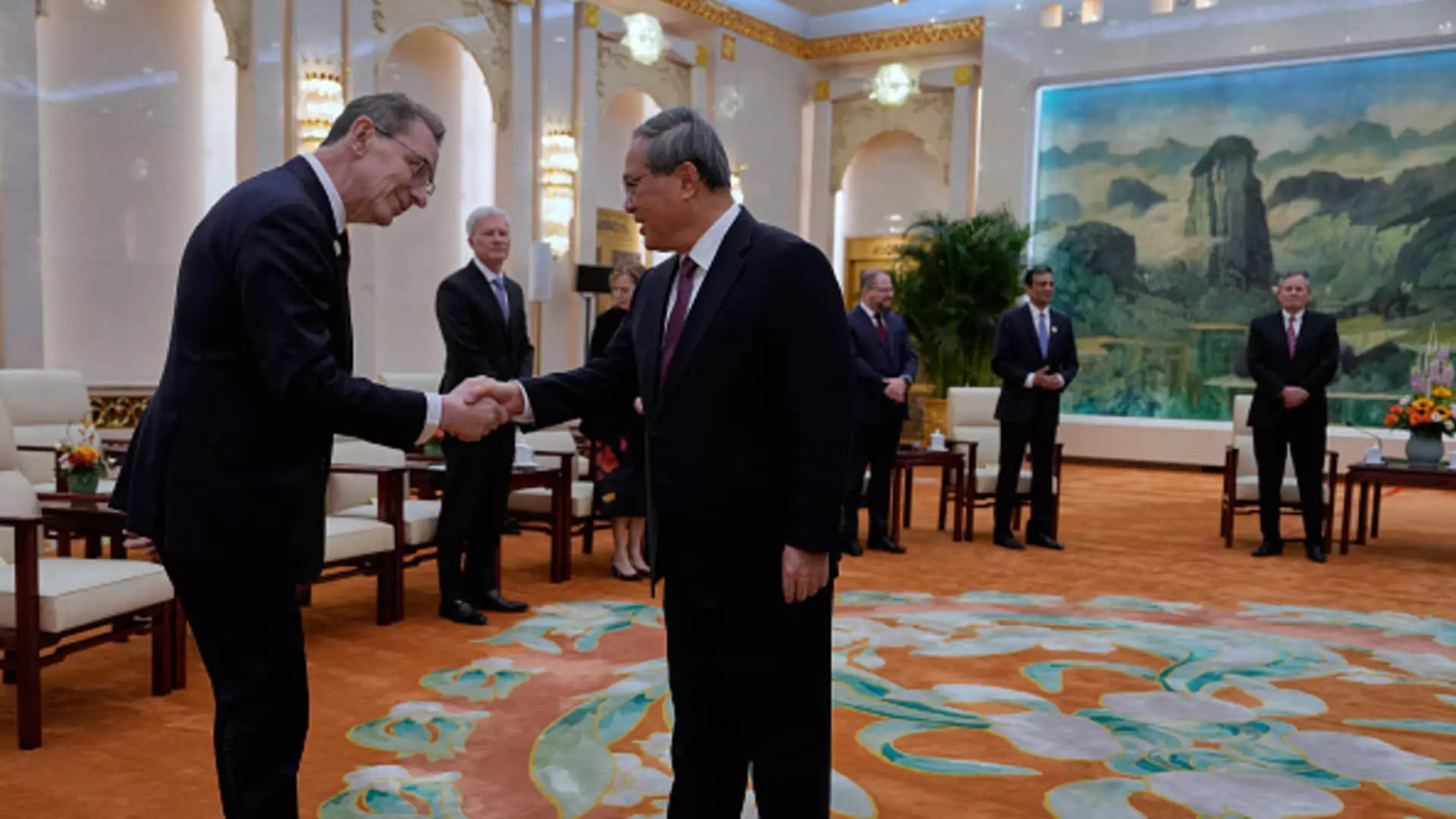The recent meeting between U.S. Senator Steve Daines and Chinese Premier Li Qiang in Beijing serves as a pivotal moment in the strained U.S.-China relationship. This meeting, which included a contingent of high-profile American executives, represents not just another diplomatic foray into the complexities of international relations, but also a calculated move by both sides to stabilize their interactions amidst encroaching economic pressures. It’s crucial to examine why this occasion transcends mere formality, as it may indicate an important shift in dialogue centered on cooperation rather than confrontation.
Acknowledging Economic Interdependence
Daines’ entourage included leaders from influential companies like Qualcomm, Pfizer, and Boeing, each boasting decades of operational experience in China. Their involvement illustrates the intrinsic value of economic interdependence. While current political sentiment often leans towards isolationism, the reality of globalization demands a unified approach to commerce and diplomacy. Daines asserted that these corporations have significantly influenced China’s economic landscape, demonstrating vested interests that transcend habitual political grandstanding.
Yet, this raises a pressing question: at what point does engagement morph into complicity? There’s an undeniable tension present in aligning American corporate interests with a government that operates under fundamentally different principles. While economic ties may encourage dialogue, the risk of overlooking human rights, intellectual property theft, and geopolitical strategy looms large.
China’s Invitation for Cooperation
Li Qiang’s remarks during the meeting were emblematic of China’s approach to diplomacy in recent years. His emphasis on “dialogue over confrontation” reflects a strategic pivot aimed at reducing the burden of U.S.-imposed tariffs. Desperate to offset domestic economic slowdowns, China is positioning itself as a partner willing to co-create solutions. Yet, beneath this veneer lies a crucial dichotomy: the question of whether China truly embraces cooperative frameworks or if it merely seeks to stave off Western criticism while pursuing its own agenda.
This balancing act presents an ethical conundrum for American diplomats and business leaders alike. Can they champion moral responsibility while simultaneously engaging with a nation that routinely flouts international standards? The Daines-Li meeting is a tangible manifestation of this struggle—a moment where pragmatism meets ethical dilemmas in international relations.
Tariffs and Trade Justifications
The specter of tariffs looms over new discussions about trade with China, particularly in light of recent American policies that threaten to introduce further levies. The potential ripple effect of these tariffs could exacerbate economic tensions, straining diplomatic avenues that might have otherwise yielded benefits. Proponents of Daines’ visit might argue that fostering relationships with Chinese leadership is essential for alleviating these economic pressures. Others, however, warn that bending too far into negotiation could dilute the urgency of addressing China’s transgressions.
It’s worth noting that Daines, a known supporter of former President Trump’s policies, faces a complex political landscape where previous trade ambitions may give way to new realities. Will he prioritize dialogue over necessary accountability? The implications of this diplomatic engagement extend beyond this meeting, potentially shaping U.S.-China relations for years to come.
From Symbolism to Substance
The symbolic significance of Daines’ trip cannot be understated. It marks the first visit by a U.S. politician to China since the Trump administration took hold, indicating a potential thaw in relations. However, symbolism holds little value without a substantive agenda. As Daines articulately navigates the meeting with clarity regarding fentanyl trafficking and the need for ethical trade practices, the challenge will be translating these dialogues into actionable commitments.
As Daines shares his hopes for future high-level talks, one must view this with cautious optimism. Engaging in meaningful dialogue is commendable; however, ensuring that this interaction results in tangible progress remains the ultimate test.
Ultimately, the Daines-Li meeting becomes a litmus test for both American diplomacy and Chinese receptivity to international expectations. Navigating these waters will demand a careful balance of economic interests and ethical accountability. In an increasingly interconnected world, the choices made today in monumental meetings like this will define not only the trajectory of U.S.-China relations but also the broader template of future international diplomacy.


Leave a Reply